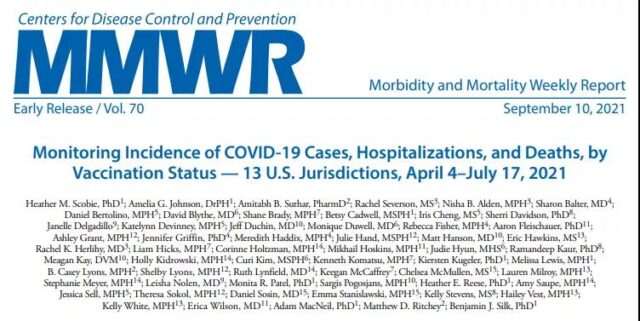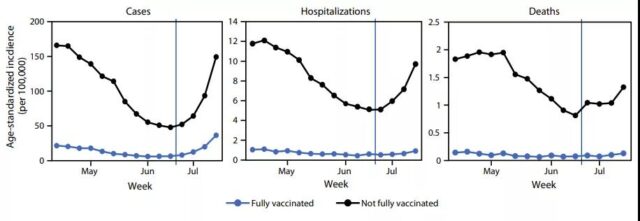People without vaccination are 11 times more likely to die from COVID-19 than those who are fully vaccinated.
- Normal Liver Cells Found to Promote Cancer Metastasis to the Liver
- Nearly 80% Complete Remission: Breakthrough in ADC Anti-Tumor Treatment
- Vaccination Against Common Diseases May Prevent Dementia!
- New Alzheimer’s Disease (AD) Diagnosis and Staging Criteria
- Breakthrough in Alzheimer’s Disease: New Nasal Spray Halts Cognitive Decline by Targeting Toxic Protein
- Can the Tap Water at the Paris Olympics be Drunk Directly?
CDC: People without vaccination are 11 times more likely to die from COVID-19
- Should China be held legally responsible for the US’s $18 trillion COVID losses?
- CT Radiation Exposure Linked to Blood Cancer in Children and Adolescents
- FDA has mandated a top-level black box warning for all marketed CAR-T therapies
- Can people with high blood pressure eat peanuts?
- What is the difference between dopamine and dobutamine?
- How long can the patient live after heart stent surgery?
US Centers for Disease Control: People without vaccination are 11 times more likely to die from COVID-19 than those who are fully vaccinated.
The new coronavirus (SARS-CoV-2) usually infects humans through the respiratory tract and causes damage to the respiratory system and various organs of the human body. Since the outbreak, more than a year has passed, the virus is causing a global pandemic, and the number of cases continues to increase. As the epidemic evolves, vaccination becomes more and more important.
On September 10, 2021, the US Centers for Disease Control and Prevention released a study comparing SARS-CoV-2 infection rates, hospitalization rates, and death rates between vaccinated and unvaccinated people.
Studies have shown that vaccines are very effective in preventing hospitalization and death. People who have not been vaccinated are 4.5 times more likely to be infected than those who are fully vaccinated, are more than 10 times more likely to be hospitalized, and 11 are more likely to die. Times.

This study analyzed more than 600,000 COVID-19 cases in 13 states in the United States from April to mid-July. If the early data is consistent, the effectiveness of the vaccine may have declined. The spring vaccine protection rate is 91%, but in June And in July it was 78%. One explanation may be a decline in immunity, followed by variants that are better at evading the immune system, or a combination of these two factors.
During the study period, among people who were not fully vaccinated, a total of 569,142 COVID-19 cases, 34,972 hospitalizations, and 6132 deaths were reported; vaccinated people reported 46,312 cases, 2976 hospitalizations, and 616 deaths.
During this period, the weekly prevalence of Delta variants increased from <1% to 90%. The full vaccination coverage rate increased from 19% to 54%, and in the last week, coverage ranged from 45% to 73%.
Between April 4 and June 19, vaccinated people accounted for 5% of the total number of cases, 7% of hospitalizations, and 8% of deaths, which were higher between June 20 and July 17. They are 18%, 14% and 16% respectively.

Cases, hospitalizations, and mortality
From April 4th to June 19th, the average number of incidents per 100,000 people who were not vaccinated was higher than the number of reported cases (112.3 vs. 10.1), hospitalization rate (9.1 vs. 0.7), and deaths among fully vaccinated people Number of people (1.6 vs. 0.1). From June 20 to July 17, the ratios were 89.1 to 19.4, 7.0 to 0.7, and 1.1 to 0.1, respectively.
In summary, data analysis shows that with the surge of Delta virus, unvaccinated people are 4.5 times more likely to be infected than fully vaccinated people, more than 10 times more likely to be hospitalized, and 11 more likely to die. Times.
In addition, regardless of the vaccination situation, the hospitalization rate and mortality rate of the elderly group are higher, which leads to a greater impact of age standardization on the overall morbidity of these results.
Another study by the Centers for Disease Control and Prevention showed that as the Delta variant dominates, the effectiveness of the vaccine is affected, especially in adults 65 years of age and older. Although the effectiveness of the vaccine has declined in this group, the protection against serious illness and death remains strong.
In summary, the study supports the evidence that continued vaccination provides strong protection, even against Delta variants.
Paper link:
http://dx.doi.org/10.15585/mmwr.mm7037e1
(source:internet, reference only)
Disclaimer of medicaltrend.org
Important Note: The information provided is for informational purposes only and should not be considered as medical advice.



